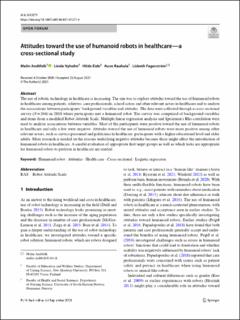Attitudes toward the use of humanoid robots in healthcare—a cross‑sectional study
Peer reviewed, Journal article
Published version
Permanent lenke
https://hdl.handle.net/11250/2975989Utgivelsesdato
2021Metadata
Vis full innførselSamlinger
Originalversjon
Andtfolk, M., Nyholm, L., Eide, H., Rauhala, A., & Fagerström, L. (2021). Attitudes toward the use of humanoid robots in healthcare—a cross-sectional study. AI & SOCIETY, 1-10. https://doi.org/10.1007/s00146-021-01271-4Sammendrag
The use of robotic technology in healthcare is increasing. The aim was to explore attitudes toward the use of humanoid robots in healthcare among patients, relatives, care professionals, school actors and other relevant actors in healthcare and to analyze the associations between participants’ background variables and attitudes. The data were collected through a cross-sectional survey (N = 264) in 2018 where participants met a humanoid robot. The survey was comprised of background variables and items from a modified Robot Attitude Scale. Multiple linear regression analysis and Spearman’s Rho correlation were used to analyze associations between variables. Most of the participants were positive toward the use of humanoid robots in healthcare and only a few were negative. Attitudes toward the use of humanoid robots were more positive among other relevant actors, such as service personnel and politicians in healthcare, participants with a higher educational level and older adults. More research is needed on the reasons underlying negative attitudes because these might affect the introduction of humanoid robots in healthcare. A careful evaluation of appropriate first target groups as well as which tasks are appropriate for humanoid robots to perform in healthcare are needed.

